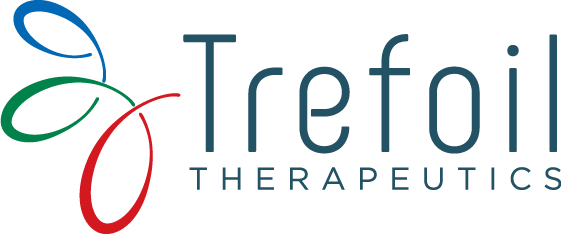
Trefoil Therapeutics Begins Second Phase 2 “STORM” Clinical Trial with Regenerative Treatment for Fuchs Endothelial Corneal Dystrophy
Study evaluating engineered FGF-1’s (TTHX114) potential in patients undergoing Descemet Stripping Only (DSO or DWEK) procedures
San Diego, CA – February 9, 2021 – Trefoil Therapeutics today announced it has begun a Phase 2 clinical trial of its engineered Fibroblast Growth Factor-1, TTHX1114, to evaluate its safety and efficacy as a regenerative treatment for patients with Fuchs Endothelial Corneal Dystrophy (FECD). The “STORM” study, the second clinical trial of TTHX1114, is designed to assess its potential to enhance corneal recovery and improve visual acuity in FECD patients undergoing Descemetorhexis without Endothelial Keratoplasty (DWEK), which is also referred to as Descemet Stripping Only (DSO), for their disease.
DSO is a surgical procedure which involves the removal of unhealthy endothelial cells and guttae (collagen bodies produced by stressed endothelial cells) in a small central area of the cornea.
“DSO is emerging as a promising alternative to corneal transplantation,” said Francis W. Price, Jr., MD, founder and president of Price Vision Group and the Cornea Research Foundation of America (Indianapolis, IN), and an investigator in the trial. “The procedure relies on the patient’s endothelial cells to migrate and repopulate the region where the cells have been removed to improve the patient’s vision. TTHX1114 is an exciting new option to help endothelial cells regenerate in corneas, and it has the potential to help many people. We are honored to have Price Vision Group participate in this study.”
The multi-center clinical trial is an open label study involving 40 or more patients already scheduled for DSO surgery. The patients will be divided into groups, with one group receiving DSO surgery only, and the other DSO along with TTHX114 intracameral injections. Endpoints being assessed in the study include endothelial recovery, corneal edema & clearing and visual acuity improvement after DSO surgery.
“This clinical trial provides an opportunity to determine whether the striking results we have seen with TTHX1114 in preclinical studies can translate into more rapid recovery of healthy endothelial cells and better vision in the DSO setting,” said David Eveleth, Ph.D., Trefoil Therapeutics’ CEO. “The trial is an important part of our clinical program to develop TTHX1114 as a pharmacological alternative to corneal transplants to improve vision in patients with FECD and other endothelial dystrophies. It also reflects our broader commitment to innovative therapeutics for patients with corneal diseases.”
The company is also developing a topical product based on TTHX1114 for the treatment of corneal epithelial disorders, which is expected to begin clinical trials later this year.
About FECD and corneal endothelial disorders
Corneal endothelial cells line the interior of the cornea and are critical to maintaining the cornea in its appropriate hydration state, which enables the cornea to function properly. FECD, the most common corneal endothelial disorder, is the leading cause of corneal transplantation/graft in the U.S. and is the only option for restoration of vision for many people. More than four percent of the population over the age of 40 is at risk of developing FECD.
The hallmark of FECD is excessive loss of these cells and the formation of guttae, resulting in diminished vision and, in severe cases, blindness. FCED is also a contributor to poor outcomes in eye surgery, including cataract surgery.
Although transplant surgery with human donor corneas may be effective in restoring vision in FECD patients, post-surgical recovery can be challenging, and most patients require long‑term immune suppression therapy to minimize the risk of corneal transplant graft rejection. DSO, which has been developed as an alternative to corneal transplants, eliminates rejection risk and the potential for side effects from immune suppressive drugs.
About TTHX1114
TTHX1114 is a proprietary, engineered form of the naturally occurring molecule Fibroblast Growth Factor-1 (FGF-1), which naturally functions to stimulate cell proliferation and migration as well as protect cells from stress and injury. TTHX1114 has been engineered to increase FGF-1’s pharmacodynamic half-life, enabling its use as a pharmaceutical. TTHX1114 has been shown in preclinical studies to stimulate endothelial cell proliferation and migration, and drive regeneration of the corneal endothelial layer. In addition to the trial in patients undergoing DSO surgery, the company is conducting a Phase 1/2 trial (“INTREPID”) to evaluate TTHX1114’s safety and ability to stimulate the regeneration of corneal endothelial cells lost due to corneal endothelial disorders, including FECD.
More information on the clinical trial can be found HERE at clinicaltrials.gov.
About Trefoil Therapeutics
Trefoil Therapeutics is a private biotechnology company focused on leveraging its engineered FGF-1 protein technology platform to develop first-in-class pharmacologic treatments for serious corneal endothelial diseases and epithelial disorders. Trefoil’s lead product candidate is TTHX1114, an engineered form of naturally occurring FGF-1 designed to stimulate corneal endothelial cell proliferation and migration, thereby reversing vision loss caused by CED. The technology underlying Trefoil’s platform was developed by co-founder Michael Blaber, Ph.D., and is licensed from Florida State University. Learn more at www.trefoiltherapeutics.com.
Safe Harbor Statement
The nonclinical research discussed in this press release is preliminary and the outcome of such studies may not be predictive of the outcome of later clinical trials. Future clinical trial results may not demonstrate safety and efficacy sufficient to obtain regulatory approval related to the nonclinical research findings discussed in this press release.
###
Contact:
Robert Gottlieb
RMG Associates, LLC
857-891-9091
Robertmg52@gmail.com


